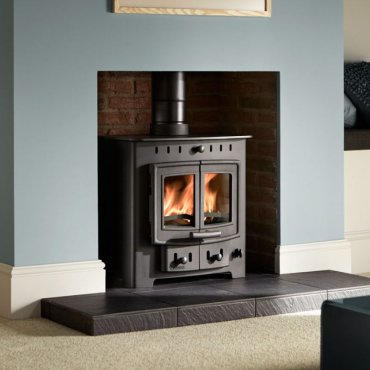 Wood burning is better in environmental terms than most fuels as the amount of carbon dioxide released into the atmosphere is the same as that absorbed by the tree during growth. It is also a renewable resource, particularly when derived from plantations and cultivated woodland. When using your wood burning stove, for optimum results, we recommend logs should be seasoned for 2 years or more to achieve a moisture content below 20%. This will not only give up to twice the output of freshly felled timber but help avoid a build up of tar in your stove's flue. Not only do modern woodburning stoves burn much cleaner and more efficiently than older conventional stoves, but the view of the fire is just spectacular. By upgrading to a CE certified and HETAS accredited wood burning stove, you can save wood, reduce smoke and enjoy the view all winter long.
Wood burning is better in environmental terms than most fuels as the amount of carbon dioxide released into the atmosphere is the same as that absorbed by the tree during growth. It is also a renewable resource, particularly when derived from plantations and cultivated woodland. When using your wood burning stove, for optimum results, we recommend logs should be seasoned for 2 years or more to achieve a moisture content below 20%. This will not only give up to twice the output of freshly felled timber but help avoid a build up of tar in your stove's flue. Not only do modern woodburning stoves burn much cleaner and more efficiently than older conventional stoves, but the view of the fire is just spectacular. By upgrading to a CE certified and HETAS accredited wood burning stove, you can save wood, reduce smoke and enjoy the view all winter long.
The Forestry Commission have recommended that millions of trees are planted to cover an extra 4% of the UK in woodland, equivalent to 30,000 football pitches a year, increasing the UK's total woodland cover to 16%. According to the Solid Fuel Technology Institute, logs are the cheapest form of heating energy. The cost per kW of useful energy is now around 4p. This compares to 5p for anthracite, 7p for natural gas, 7.5p for oil, 9p for LPG and 12p for electricity.
House Warming Selby presently have a number of stoves on special offer. Although summer might seem like a counterintuitive time to consider a stove installation, it actually has a number of advantages. Most obvious of which is it's reasonably warm outside so you'll not loose the heater from your house during installation.